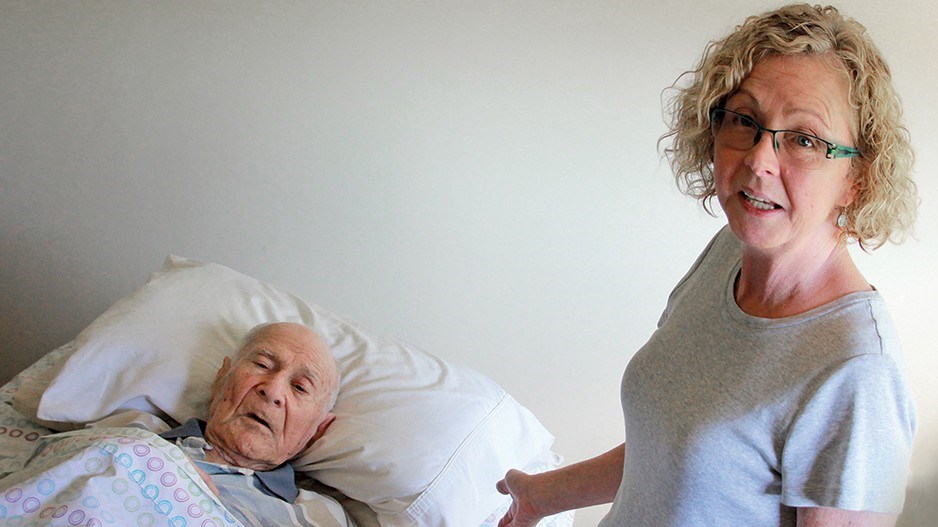For Surrey resident Debbie Edwards, caring for her elderly father-in-law, Mogamat Ganief Edwards, is a full-time job. At 93, he has Alzheimer’s disease and needs care throughout the day. While Edwards and her husband, Rasheed, could put the elder Edwards into a seniors’ care facility, they’d rather he be at home.
“We feel very strongly about his quality of life and felt that if he went into a seniors’ care facility that he would die there,” said Edwards, who has been looking after he father-in-law for more than seven years.
In October 2013, B.C. Health Minister Terry Lake ordered an operational review of Fraser Health, which resulted in 10 “priority action” areas, one of them being increasing community care to help take the burden off Fraser Health’s overcrowded hospitals. The review also came with an additional $60 million over two years for the regional health authority.
Fraser Health, B.C.’s largest health authority and Surrey’s biggest employer (see “Biggest Surrey-based employers” – page 18), has an operating budget of $3.3 billion.
Edwards said the health-care workers from ParaMed – a Vancouver-based company that offers home health-care services and workplace health and wellness programs – contracted out by Fraser Health, have built a great relationship with her father-in-law over the past seven years. But she can’t say the same for the health authority, which oversees his home-care plan.
“We have a case manager at Fraser Health. She has never met Ganief. I have never met her. She has never done a home visit. There is no personal touch.”
Edwards said she recently bought a new bed for her father-in-law, but ParaMed workers said the bed was too low to allow them to change him. She notified Fraser Health and asked for a hospital bed offered through her father-in-law’s medical plan so he could remain at home and not be forced into a care facility or hospital bed, but Edwards said she received no response.
“We let our case manager know two months ago that this was the case. She never replied to us.”
Keith McBain, Fraser Health’s executive director for community health services in Surrey, said building trust with clients and ensuring they receive safe, appropriate health care is at the heart of Fraser Health’s home health and home support services.
McBain said a Fraser Health community care professional completed the first client assessment with Debbie and Ganief Edwards in their home before handing off services to ParaMed. “In this case, Mr. Edwards’ family requested an automated hospital bed, and the community care professional requested the necessary occupational therapist assessment. This request is currently in progress, and the family has been notified of this. As a client’s health changes over time, so will their health-care needs, and that is why open communication between the client, the family, the care provider and Fraser Health is so important.”
Each day, Fraser Health employees make 630 home-care nursing visits. There are currently 7,760 residents in long-term care facilities throughout the health authority’s jurisdiction.
In Surrey, the health authority employs 7,678 staff and paid $215 million to vendors and contractors in the city last year alone.
In 2006, the federal government created the Office of the Minister of State (Seniors) within Employment and Social Development Canada to examine the economic impact of the country’s rapidly increasing seniors’ population.
By 2030, according to the ministry’s report, seniors (ages 65 and over) in Canada will number more than 9.5 million and make up 23% of the country’s population. Most of them will be retired or unable to work. The report also looked at the financial toll on adults who keep elderly parents at home.
A recent BC Health Coalition report outlined the growing care issues facing family members like Edwards. From 2001 to 2010, access to home support services for people 75 and over dropped 30%. In 2013-14 the number of clients receiving home support was identical to the number receiving services in 2001-02. However, over those 12 years, there was a 49% increase in clients 80 years or older.
But Edwards said the government has not followed through on it promises to increase home-care services in her area.
“Caring for Ganief is something we want to do as a family. And [Fraser Health] wants us to do that so he’s not in the hospital. So they need to back that up with support and services when we need them.
“I remember the hope that we had about the initiative from the provincial government stepping up for seniors in B.C. to allow them to remain in their homes.”
The Ministry of Health did not respond to interview requests by press deadline.




